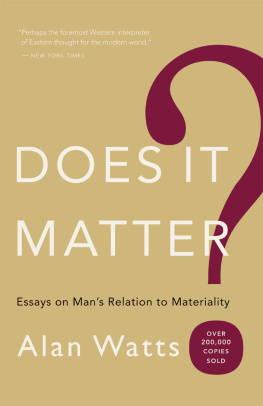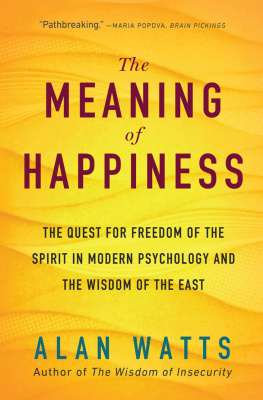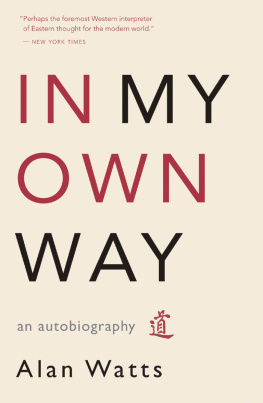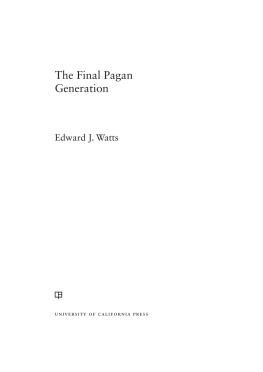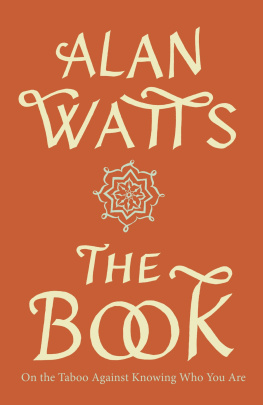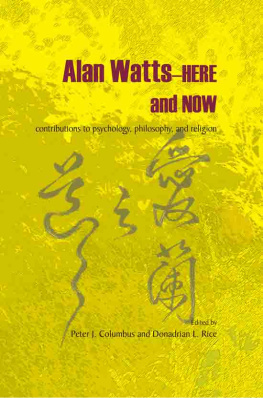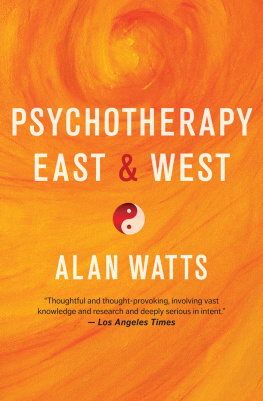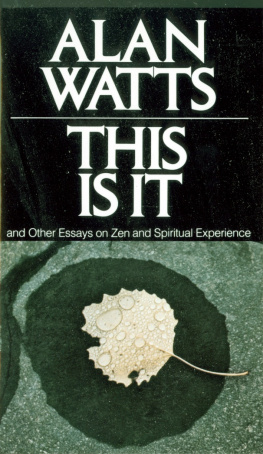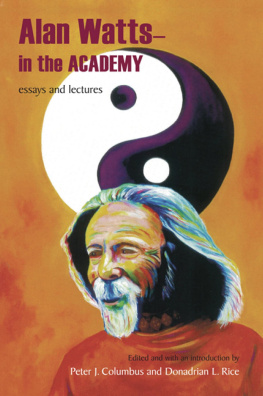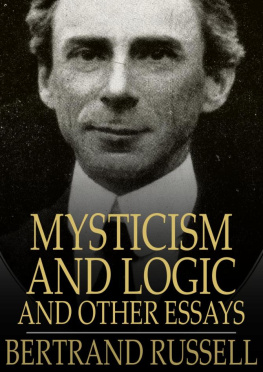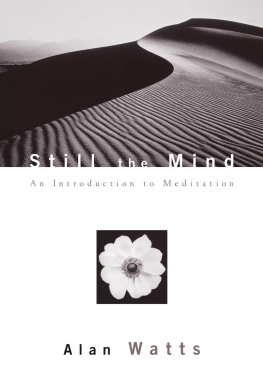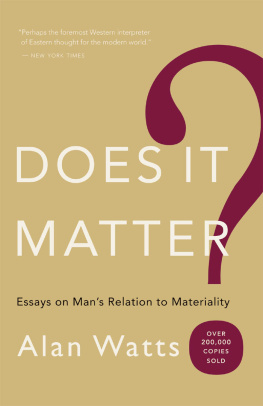Watts - Does It Matter?: Essays on Mans Relation to Materiality
Here you can read online Watts - Does It Matter?: Essays on Mans Relation to Materiality full text of the book (entire story) in english for free. Download pdf and epub, get meaning, cover and reviews about this ebook. City: Novato, year: 2007, publisher: New World Library, genre: Romance novel. Description of the work, (preface) as well as reviews are available. Best literature library LitArk.com created for fans of good reading and offers a wide selection of genres:
Romance novel
Science fiction
Adventure
Detective
Science
History
Home and family
Prose
Art
Politics
Computer
Non-fiction
Religion
Business
Children
Humor
Choose a favorite category and find really read worthwhile books. Enjoy immersion in the world of imagination, feel the emotions of the characters or learn something new for yourself, make an fascinating discovery.
- Book:Does It Matter?: Essays on Mans Relation to Materiality
- Author:
- Publisher:New World Library
- Genre:
- Year:2007
- City:Novato
- Rating:3 / 5
- Favourites:Add to favourites
- Your mark:
- 60
- 1
- 2
- 3
- 4
- 5
Does It Matter?: Essays on Mans Relation to Materiality: summary, description and annotation
We offer to read an annotation, description, summary or preface (depends on what the author of the book "Does It Matter?: Essays on Mans Relation to Materiality" wrote himself). If you haven't found the necessary information about the book — write in the comments, we will try to find it.
Watts: author's other books
Who wrote Does It Matter?: Essays on Mans Relation to Materiality? Find out the surname, the name of the author of the book and a list of all author's works by series.
Does It Matter?: Essays on Mans Relation to Materiality — read online for free the complete book (whole text) full work
Below is the text of the book, divided by pages. System saving the place of the last page read, allows you to conveniently read the book "Does It Matter?: Essays on Mans Relation to Materiality" online for free, without having to search again every time where you left off. Put a bookmark, and you can go to the page where you finished reading at any time.
Font size:
Interval:
Bookmark:

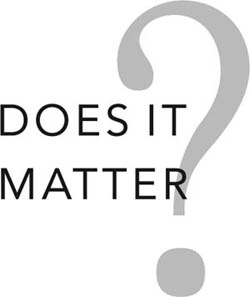
Beyond Theology
The Book
Cloud-hidden, Whereabouts Unknown
The Joyous Cosmology
Myth and Ritual in Christianity
Nature, Man and Woman
Psychotherapy East and West
The Spirit of Zen
The Supreme Identity
Tao
This Is It
The Way of Zen
The Wisdom of Insecurity
In My Own Way
Still the Mind
What Is Tao?
What Is Zen?
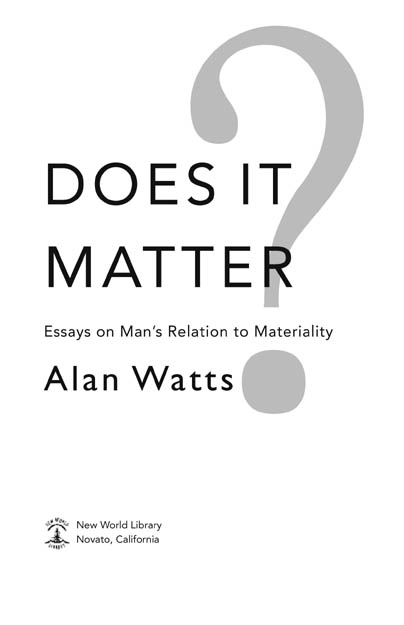

Copyright 1971 by Alan Watts; copyright 2007 by Joan Watts Originally published by Pantheon Books, 1970; Vintage Books edition, 1971
All rights reserved. This book may not be reproduced in whole or in part, stored in a retrieval system, or transmitted in any form or by any means electronic, mechanical, or other without written permission from the publisher, except by a reviewer, who may quote brief passages in a review.
Psychedelics and Religious Experience is reprinted by permission of the California Law Review. Copyright 1968 by California Law Review, Inc.
Text design and typography by Tona Pearce Myers
Library of Congress Cataloging-in-Publication Data Watts, Alan, 19151973. Does it matter? : essays on mans relation to materiality / Alan Watts.
p. cm.
Originally published: New York : Pantheon Books, 1970.
ISBN 978-1-57731-585-8 (pbk. : alk. paper)
1. Conduct of life. I. Title.
BJ1581.2.W36 2007
170dc22
First New World Library printing, November 2007
ISBN10: 1-57731-585-5
ISBN13: 978-1-57731-585-8
Printed in the United States on acid-free, partially recycled paper
 New World Library is a proud member of the Green Press Initiative.
New World Library is a proud member of the Green Press Initiative.
10 9 8 7 6 5 4 3 2 1
CONTENTS
T his book consists of a series of recent essays on mans relationship to the material worldto what we call nature, the physical environment, the body, and substantial matter. In using such words, I am at once aware that all of them are philosophical and abstract concepts. Equally so are notions that reality is in fact mental or spiritual. For I am trying to talk about something which is not talk, and which words and other symbols only represent. Alfred Korzybski called it the nonverbal or (with a delightful double-entendre) unspeakable world.
Reality is, of course, neither matter nor spirit. It is a percept, not a concept, and everyone knows what it is in the sense that one knows how to breathe without the least knowledge of physiology. As Saint Augustine of Hippo put it when asked about the nature of time: I know what it is, but when you ask me I dont. Lets say (since in writing a book one has to say something) that reality or existence is a multidimensional and interwoven system of varying spectra of vibrations, and that mans five senses are attuned only to very small bands of these spectra. That sounds very profound and may mean nothing at all, but in reading it one should attend to the sound of the words rather than their meaning. Then you will get my point.
The point is that I am trying to focus attention on what is happening as distinct from the various ways in which it is described by means of words, numbers, and other symbols. The disease of civilization, whether Occidental or Oriental, is that we have too much of a good thing: we confuse the marvelous facility of description with what is actually going on, the world as labeled and classified with the world as it is. If I talk all the time I am not open to what anyone else has to say. Likewise, if I think (or talk to myself ) all the time, I have nothing to think about except thoughts. I have less and less awareness of the world, the system of vibrations, which words and thoughts represent.
I am not an antiintellectual. After all, I make my living by various feats of verbalization. But there is no grist for the intellectual mill if we get into a situation where thought is all about thinking, and where books are about nothing except other books.
It is for this reason that an enormous amount of current intellectual, philosophical, and even scientific discourse strikes me increasingly as absurd. It is an attempt to translate a nonlinear and multidimensional system of vibrations into a linear (alphabetical or mathematical) system of symbols; and it just cant be done. It is like trying to transport the Atlantic Ocean into the Pacific with a beer mug: however rapidly automated and cyberneticized the process may be, it is futile.
Not so long ago a professor of Harvard University said in connection with the scandal about Timothy Leary and consciousnesschanging drugsthat no knowledge is intellectually and academically respectable which cannot be put into words. Alas for the departments of music, art, dancing, and physical education! The problem is that literate and civilized people do not understand that their brains are much smarter than their minds, considering mind as the total system of verbal, mathematical, and notational rules by which we communicate and preserve information. Neurologists are the first to admit that their science does not by any means comprehend the nervous system, which is only to say that the brain is far more complexly organized than our coded, linear information about it. A trained organist, for example, can simultaneously keep in mind four different rhythms or melodiesone for each hand and one for each footbut even very intelligent people can hardly cope with five, six, or seven variables at the same time. But the nervous system, in organizing all the functions of the body, is dealing with thousands of variables at once, for the brain operates intelligently without having to stop to think.
Thus every genius, who cannot explain how he paints, dances, or pitches a ball, is using his brain rather than his mind. Consider, for instance, the differences between Hindu and classical Western music. We start by learning to read a system of notation which limits us to a twelvetone scale and to the rhythmic pulses of semibreve, minim, crotchet, quaver, semiquaver, and demisemiquaver, each of which, by being dotted, may be prolonged by a half of its value. The tradition of our music, because passed down through notation, is essentially literate, and all of iteven the most sentimental songs of lovesounds to Orientals like a military march. The Hindus use notation simply as an aidemmoire for certain themes. One learns music by following the performance of a teacher, imitating the subtle interplay of his nerves and muscle with string, reed, or drum as a result of which there are moments of ecstasy in Hindu music in which even God calls out for help.
Thus the point I am making in all these essays is that civilized people, whether Western or Eastern, need to be liberated and dehypnotized from their systems of symbolism and, thereby, become more intensely aware of the living vibrations of the real world. For lack of such awareness our consciousnesses and consciences have become calloused to the daily atrocities of burning children with napalm, of saturation bombing of fertile earth with all its plants, wild animals, and insects (not to mention people), and of manufacturing nuclear and chemical weapons concerning which the real problem is not so much how to prevent their use as how to get them off the face of the earth.
Font size:
Interval:
Bookmark:
Similar books «Does It Matter?: Essays on Mans Relation to Materiality»
Look at similar books to Does It Matter?: Essays on Mans Relation to Materiality. We have selected literature similar in name and meaning in the hope of providing readers with more options to find new, interesting, not yet read works.
Discussion, reviews of the book Does It Matter?: Essays on Mans Relation to Materiality and just readers' own opinions. Leave your comments, write what you think about the work, its meaning or the main characters. Specify what exactly you liked and what you didn't like, and why you think so.

